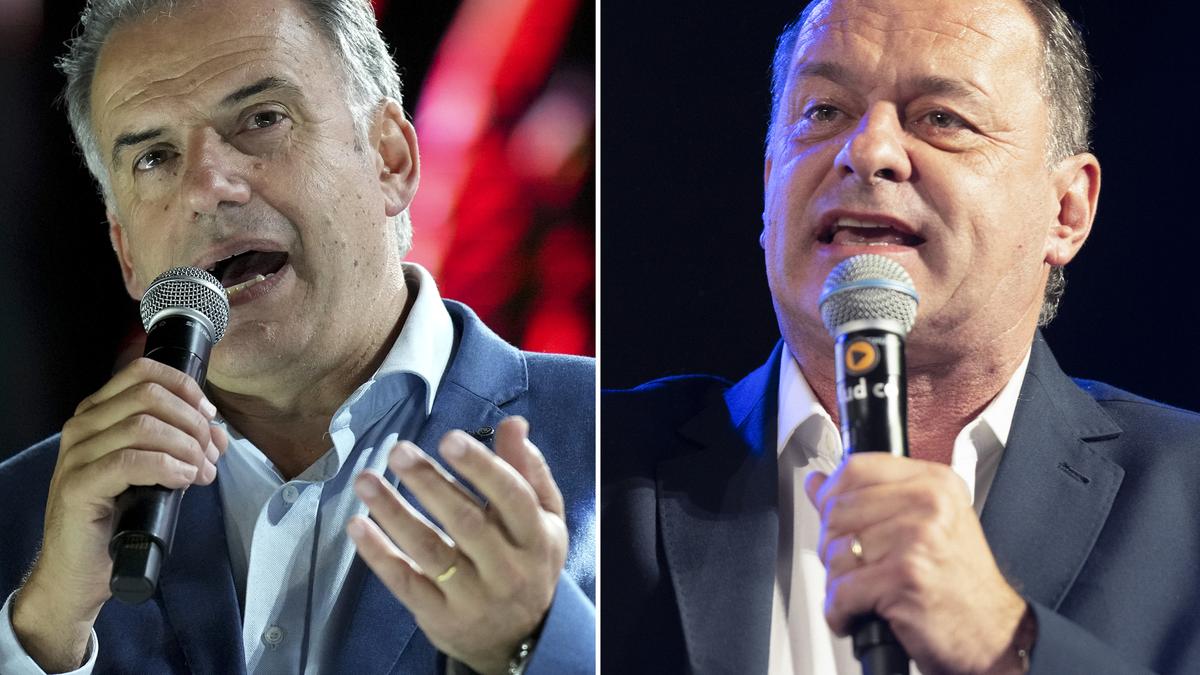Presidential contender Yamandu Orsi, left, of the Broad Front coalition on October 22, 2024, and rival, National Party candidate Alvaro Delgado, left, on November 20, 2024, both in Montevideo, Uruguay. , Photo Credit: AP
Uruguayans will go to the polls on Sunday (November 24, 2024) with the leftist coalition of renowned former President Jose Mujica in hopes of reclaiming the country’s top job five years after a right-wing victory based on concerns over crime and taxes.
Former history teacher Yamandu Orsi of the leftist Frente Amplio (Broad Front) will face former vet Alvaro Delgado of the National Party, a member of outgoing President Luis Lacalle Pou’s centre-right Republican coalition.
Orsi, 57, is seen as a disciple of 89-year-old “Pepe” Mujica, a former leftist guerrilla who became known as “the world’s poorest president” during his 2010-2015 rule because of his modest lifestyle. Used to go.
Orsi received 43.9% of the vote in the first round of voting on October 27 – short of the 50 percent cutoff to avoid a runoff, but ahead of the 26.7% of ballots cast for Delgado, 55.
The pair came out on top of a crowded field of 11 candidates seeking to replace Lacalle Pou, who has high approval ratings but is constitutionally barred from seeking a second consecutive term.
Polls point to a tight race on Sunday, with Orsi only marginally ahead in the declared intentions of voters in South America’s second-smallest country.
Other parties within the Republican coalition have since thrown their support behind Delgado, increasing his numbers.
“The conditions are in place for us to take charge … to make the changes that are needed in the country,” Orsi said at a closing campaign rally on Wednesday.
Also read:cold wind from the north
For his part, Delgado told supporters that Uruguay is in a better position today thanks to the Republican coalition in charge, adding, “I am ready to lead”.
liberal mold breaker
Orsi’s victory would push Uruguay back to the left after five years of conservative rule in the country of 3.4 million inhabitants.
The Frente Amplio coalition broke the decades-long conservative hold with an electoral victory in 2005, and held the presidency for three consecutive terms.
It was voted down in 2020 due to concerns about increased crime due to higher taxes and an increase in cocaine trafficking through the port of Montevideo.
Polling data shows that five years later, perceived insecurity remains Uruguayans’ top concern.
The first round of voting was accompanied by a referendum asking Uruguayans whether police should be allowed to conduct night-time raids on homes as part of the fight against drug trafficking. The initiative failed.
Voting is mandatory in Uruguay, one of Latin America’s most stable democracies, which boasts a comparatively high per capita income and low poverty levels.
During the heyday of leftist rule, Uruguay legalized abortion and gay marriage, became the first Latin American country to ban smoking in public places, and in 2013 became the first country in the world to allow recreational cannabis use.
published – November 22, 2024 08:42 am IST
